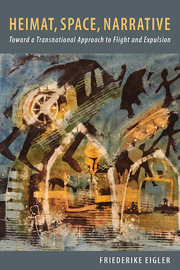Book contents
- Frontmatter
- Dedication
- Contents
- Acknowledgments
- Introduction: Geocritical Approaches to Place-Bound Belonging
- Part I Reassessing the Study of Heimat, Space, and Postwar Expulsion
- 1 Heimat and the Spatial Turn
- 2 Narrative and Space
- 3 Flight and Expulsion
- Part II Horst Bienek's Novels on Upper Silesia (1975–82)
- Part III Contemporary Novels
- Conclusion: “Lived Spaces” in Literary Narratives
- Filmography
- Works Cited
- Index
1 - Heimat and the Spatial Turn
from Part I - Reassessing the Study of Heimat, Space, and Postwar Expulsion
Published online by Cambridge University Press: 05 August 2014
- Frontmatter
- Dedication
- Contents
- Acknowledgments
- Introduction: Geocritical Approaches to Place-Bound Belonging
- Part I Reassessing the Study of Heimat, Space, and Postwar Expulsion
- 1 Heimat and the Spatial Turn
- 2 Narrative and Space
- 3 Flight and Expulsion
- Part II Horst Bienek's Novels on Upper Silesia (1975–82)
- Part III Contemporary Novels
- Conclusion: “Lived Spaces” in Literary Narratives
- Filmography
- Works Cited
- Index
Summary
The German concept of Heimat carries a rich set of cultural and ideological connotations that usually combine notions of belonging and identity with affective attachment to a specific place or region. Traditional notions of Heimat emerged in the late eighteenth and early nineteenth century and linked ethnic and cultural identity to a place of origin. Early representations of Heimat were not aligned with conservative political ideologies, but over the course of the nineteenth and first half of the twentieth centuries the term was often appropriated for national or nationalistic causes—appropriations that brought to the fore static and exclusionary manifestations of place. After the Second World War the notion of Heimat assumed a special role in highly politicized discourses on the lost Heimat in the East. In the public realm, these references to the lost Heimat were linked with territorial claims to regions that used to be part of Germany and that became part of Poland as a consequence of the two World Wars and the redrawing of the border between Germany and Poland. Against this historical backdrop, this study examines the relationship between public discourses on the lost Heimat in the East and geopoetics—literary renderings of Heimat.
By employing and critically investigating a concept that is so deeply embedded in German culture and implicated in German history, I continue the line of argument that informs the volume Heimat: At the Intersection of Memory and Space, which I coedited with Jens Kugele.
- Type
- Chapter
- Information
- Heimat, Space, NarrativeToward a Transnational Approach to Flight and Expulsion, pp. 13 - 30Publisher: Boydell & BrewerPrint publication year: 2014



